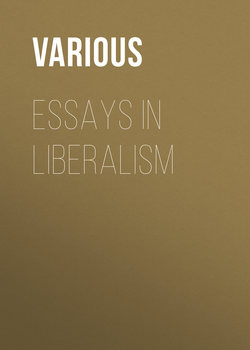Читать книгу Essays in Liberalism - Various - Страница 15
THE BALANCE OF POWER
By Professor A.F. Pollard
Basis of Security
ОглавлениеBut no one who thinks that power—whether a Monopoly, a Balance, or even a Community of Power is the ultimate guardian angel of our peace, has the root of the matter in him. Men, said Burke, are not governed primarily by laws, still less by force; and behind all power stands opinion. To believe in public opinion rather than in might excludes the believer from the regular forces of militarism and condemns him as a visionary and blind. For advocates of the Balance of Power bear a striking resemblance to the Potsdam school; and even so moderate a German as the late Dr. Rathenau declared in his unregenerate days before the war that Germans were not in the habit of reckoning with public opinion. Nevertheless, there is a frontier in the world which for a century and more has enjoyed a security which all the armaments of Prussian militarism could not give the German Fatherland; and the absolute security of that frontier rests not upon a monopoly nor a community, still less upon a balance of power, but on the opinion held on both sides of that frontier that all power is irrational and futile as a guarantee of peace between civilised or Christian people.
Let us look at that frontier for a moment. It is in its way the most wonderful thing on earth, and it holds a light to lighten the nations and to guide our feet into the way of peace. It runs, of course, between the Dominion of Canada and the United States of America across the great lakes and three thousand miles of prairie; and from the military and strategic point of view it is probably the worst frontier in the world. Why then is it secure? Is it because of any monopoly or community or balance of power? Is it because the United States and the British Empire are under a common government, or because there is along that frontier a nicely-balanced distribution of military strength? No, it is secure, not in spite of the absence of force, but because of the absence of force; and if you want to destroy the peace of that frontier from end to end, all you need to do is to send a regiment to protect it, launch a Dreadnought on those lakes, and establish a balance of power. For every regiment or warship on one side will produce a regiment or warship on the other; and then your race for armaments will begin, and the poison will spread until the whole of America becomes like Europe, an armed camp of victims to the theory of strategic frontiers and of the Balance of Power.
Those theories, their application, and their consequences recently cost the world thirty million casualties and thousands of millions of pounds within a brief five years, and yet left the frontiers of Europe less secure than they were before. Three thousand miles of frontier in North America have in more than a hundred years cost us hardly a life, or a limb, or a penny. As we put those details side by side we realise quantula regitur mundus sapientia—with how little wisdom do men rule the world. Yet the truth was told us long ago that he that ruleth his spirit is better than he that taketh a city, and we might have learnt by our experience of the peace that the only conquest that really pays is the conquest of oneself.
The real peace of that North American frontier is due to no conquest of Americans by Canadians or of Canadians by Americans, but to their conquest of themselves and of that foolish pride of “heathen folk who put their trust in reeking tube and iron shard.” Let us face the facts, whatever the visionaries and the blind may say. So be it. The war is a fact, and so is the desolation it has wrought. But that Anglo-American frontier is also a fact, and so is that century of peace which happily followed upon the resolution to depend for the defence of that frontier on moral restraint instead of on military force. Verily, peace hath her victories not less renowned than those of war.
